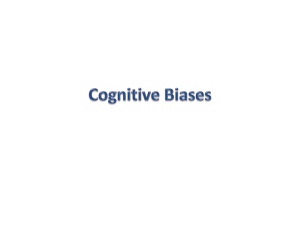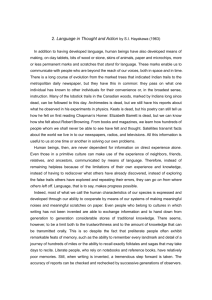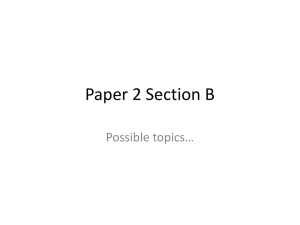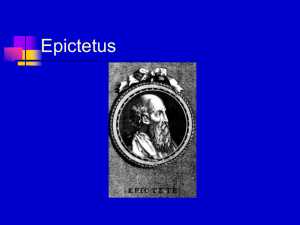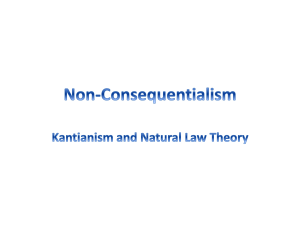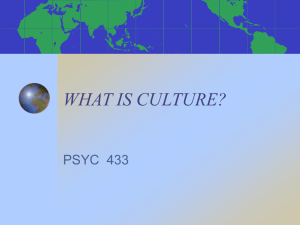Heidegger on Philosophy
advertisement
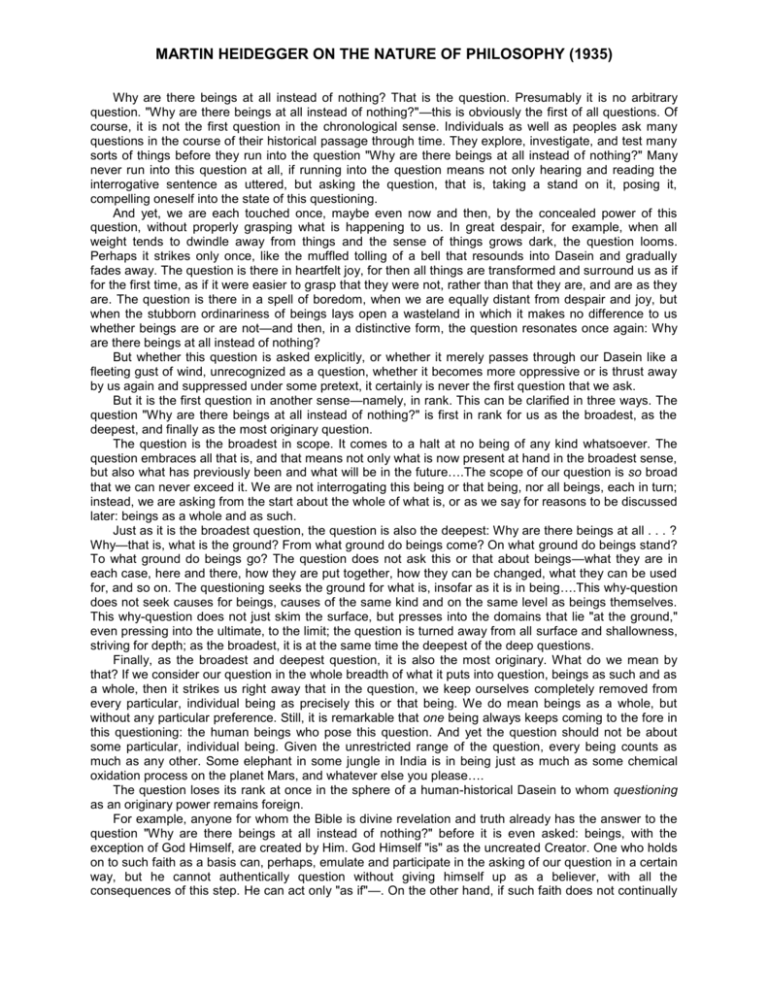
MARTIN HEIDEGGER ON THE NATURE OF PHILOSOPHY (1935) Why are there beings at all instead of nothing? That is the question. Presumably it is no arbitrary question. "Why are there beings at all instead of nothing?"—this is obviously the first of all questions. Of course, it is not the first question in the chronological sense. Individuals as well as peoples ask many questions in the course of their historical passage through time. They explore, investigate, and test many sorts of things before they run into the question "Why are there beings at all instead of nothing?" Many never run into this question at all, if running into the question means not only hearing and reading the interrogative sentence as uttered, but asking the question, that is, taking a stand on it, posing it, compelling oneself into the state of this questioning. And yet, we are each touched once, maybe even now and then, by the concealed power of this question, without properly grasping what is happening to us. In great despair, for example, when all weight tends to dwindle away from things and the sense of things grows dark, the question looms. Perhaps it strikes only once, like the muffled tolling of a bell that resounds into Dasein and gradually fades away. The question is there in heartfelt joy, for then all things are transformed and surround us as if for the first time, as if it were easier to grasp that they were not, rather than that they are, and are as they are. The question is there in a spell of boredom, when we are equally distant from despair and joy, but when the stubborn ordinariness of beings lays open a wasteland in which it makes no difference to us whether beings are or are not—and then, in a distinctive form, the question resonates once again: Why are there beings at all instead of nothing? But whether this question is asked explicitly, or whether it merely passes through our Dasein like a fleeting gust of wind, unrecognized as a question, whether it becomes more oppressive or is thrust away by us again and suppressed under some pretext, it certainly is never the first question that we ask. But it is the first question in another sense—namely, in rank. This can be clarified in three ways. The question "Why are there beings at all instead of nothing?" is first in rank for us as the broadest, as the deepest, and finally as the most originary question. The question is the broadest in scope. It comes to a halt at no being of any kind whatsoever. The question embraces all that is, and that means not only what is now present at hand in the broadest sense, but also what has previously been and what will be in the future….The scope of our question is so broad that we can never exceed it. We are not interrogating this being or that being, nor all beings, each in turn; instead, we are asking from the start about the whole of what is, or as we say for reasons to be discussed later: beings as a whole and as such. Just as it is the broadest question, the question is also the deepest: Why are there beings at all . . . ? Why—that is, what is the ground? From what ground do beings come? On what ground do beings stand? To what ground do beings go? The question does not ask this or that about beings—what they are in each case, here and there, how they are put together, how they can be changed, what they can be used for, and so on. The questioning seeks the ground for what is, insofar as it is in being….This why-question does not seek causes for beings, causes of the same kind and on the same level as beings themselves. This why-question does not just skim the surface, but presses into the domains that lie "at the ground," even pressing into the ultimate, to the limit; the question is turned away from all surface and shallowness, striving for depth; as the broadest, it is at the same time the deepest of the deep questions. Finally, as the broadest and deepest question, it is also the most originary. What do we mean by that? If we consider our question in the whole breadth of what it puts into question, beings as such and as a whole, then it strikes us right away that in the question, we keep ourselves completely removed from every particular, individual being as precisely this or that being. We do mean beings as a whole, but without any particular preference. Still, it is remarkable that one being always keeps coming to the fore in this questioning: the human beings who pose this question. And yet the question should not be about some particular, individual being. Given the unrestricted range of the question, every being counts as much as any other. Some elephant in some jungle in India is in being just as much as some chemical oxidation process on the planet Mars, and whatever else you please…. The question loses its rank at once in the sphere of a human-historical Dasein to whom questioning as an originary power remains foreign. For example, anyone for whom the Bible is divine revelation and truth already has the answer to the question "Why are there beings at all instead of nothing?" before it is even asked: beings, with the exception of God Himself, are created by Him. God Himself "is" as the uncreated Creator. One who holds on to such faith as a basis can, perhaps, emulate and participate in the asking of our question in a certain way, but he cannot authentically question without giving himself up as a believer, with all the consequences of this step. He can act only "as if"—. On the other hand, if such faith does not continually 2 expose itself to the possibility of unfaith, it is not faith but a convenience. It becomes an agreement with oneself to adhere in the future to a doctrine as something that has somehow been handed down. This is neither having faith nor questioning, but indifference—which can then, perhaps even with keen interest, busy itself with everything, with faith as well as with questioning. Now by referring to safety in faith as a special way of standing in the truth, we are not saying that citing the words of the Bible, "In the beginning God created heaven and earth, etc.," represents an answer to our question. Quite aside from whether this sentence of the Bible is true or untrue for faith, it can represent no answer at all to our question, because it has no relation to this question. It has no relation to it, because it simply cannot come into such a relation. What is really asked in our question is, for faith, foolishness. Philosophy consists in such foolishness. A "Christian philosophy" is a round square and a misunderstanding. To be sure, one can thoughtfully question and work through the world of Christian experience—that is, the world of faith. That is then theology. Only ages that really no longer believe in the true greatness of the task of theology arrive at the pernicious opinion that, through a supposed refurbishment with the help of philosophy, a theology can be gained or even replaced, and can be made more palatable to the need of the age. Philosophy, for originally Christian faith, is foolishness. Philosophizing means asking: "Why are there beings at all instead of nothing?" Actually asking this means venturing to exhaust, to question thoroughly, the inexhaustible wealth of this question, by unveiling what it demands that we question. Whenever such a venture occurs, there is philosophy…. Philosophy…is not a kind of knowledge which one could acquire directly, like vocational and technical expertise, and which, like economic and professional knowledge in general, one could apply directly and evaluate according to its usefulness in each case…. One expects philosophy to promote, and even to accelerate, the practical and technical business of culture by alleviating it, making it easier. But—according to its essence, philosophy never makes things easier, but only more difficult. And it does so not just incidentally, not just because its manner of communication seems strange or even deranged to everyday understanding. The burdening of historical Dasein, and thereby at bottom of Being itself, is rather the genuine sense of what philosophy can achieve. Burdening gives back to things, to beings, their weight (Being). And why? Because burdening is one of the essential and fundamental conditions for the arising of everything great, among which we include above all else the fate of a historical people and its works. But fate is there only where a true knowing about things rules over Dasein. And the avenues and views of such a knowing are opened up by philosophy…. It is entirely correct and completely in order to say, "You can't do anything with philosophy." The only mistake is to believe that with this, the judgment concerning philosophy is at an end. For a little epilogue arises in the form of a counterquestion: even if we can't do anything with it, may not philosophy in the end do something with us, provided that we engage ourselves with it? Let that suffice for us as an explication of what philosophy is not. At the outset we spoke of a question: "Why are there beings at all instead of nothing?" We asserted that to ask this question is to philosophize. Whenever we set out in the direction of this question, thinking and gazing ahead, then right away we forgo any sojourn in any of the usual regions of beings. We pass over and surpass what belongs to the order of the day. We ask beyond the usual, beyond the ordinary that is ordered in the everyday. Nietzsche once said (VII, 269): "A philosopher: that is a human being who constantly experiences, sees, hears, suspects, hopes, dreams extraordinary things . . ."… Philosophizing, we can…say, is extra-ordinary questioning about the extra-ordinary. (Excerpted from Martin Heidegger, Introduction to Metaphysics, translated by Gregory Fried and Richard Polt [New Haven: Yale University, 2000], pp. 1-6, 9, 12-14.)

